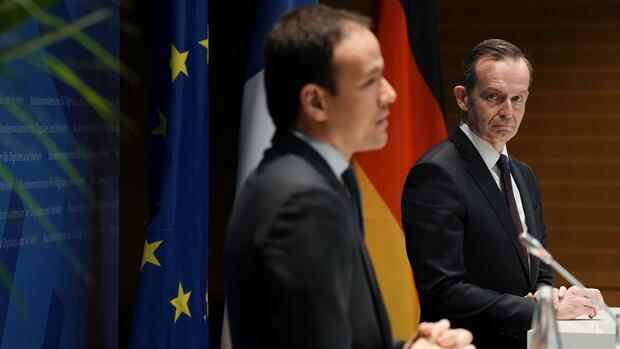How far does international data exchange go? The digital ministers are discussing this in Düsseldorf.
(Photo: imago images/Political Moments)
Berlin In the run-up to the G7 meeting of digital ministers in Düsseldorf, the host himself describes the challenge of the meeting. “We will strengthen digital sovereignty without erecting new barriers,” promises Volker Wissing (FDP) in a guest article for the Handelsblatt for the upcoming meeting his international colleagues. A sentence that sounds good, but its implementation is one of the really big digital policy dilemmas.
Wissing wants to discuss these and other issues, such as cyber defense, which is becoming increasingly urgent with the war in Ukraine, with his counterparts from France, Italy, Japan, Canada, the United Kingdom and the United States in the coming days. Germany holds the presidency of the G7 countries this year.
However, the question that Wissing raised in advance is not easy to answer. How can data be exchanged for the benefit of all without taking away the sovereignty over the exploitation of their own information from individuals, companies and states?
Efforts are also being made in Europe to physically store their own data on the continent in the name of “digital sovereignty”. With projects like the pan-European cloud infrastructure project Gaia-X, the Europeans want to take back sovereignty over their data, which currently often lies with US mega-companies.
Top jobs of the day
Find the best jobs now and
be notified by email.
At the same time, the attempt to regulate the exchange of data between the USA and the EU using the so-called Privacy Shield was overturned by a court. EU Commission President Ursula von der Leyen and US President Joe Biden announced a breakthrough for a new start in March. How exactly that can look like should also be a big topic in Düsseldorf.
Efforts to connect the Japanese data platforms to the European project Gaia-X
This is opposed to the protectionist approaches of authoritarian states such as China and, increasingly, Russia to decouple their own networks from the “World Wide Web”. China has been promoting such efforts with the “Golden Shield” project for a long time. Russia is also working on its own version of the Internet, the so-called “Runet”.
>> Also read here: Iron Curtain of the 21st Century: How the Kremlin wants to disconnect Russia from the Internet
The G7 deliberately wants to choose a different path. There are initial efforts to connect the Japanese data platforms to the European project Gaia-X. The German digital minister spoke out in advance against the obligation to store data in a specific location and thus also wants to limit the ability of states to influence data traffic.
But it is precisely these possibilities, of which the USA, as a G7 member, have already made use via the National Security Agency, at the same time fuel skepticism about excessively free and cross-border data traffic. The question of how intensive the cooperation between the participants of the meeting will really be is therefore likely to become one of the major bones of contention.
On the other hand, there is agreement that cyber resilience must be strengthened as quickly as possible in order to be prepared for possible attacks from the Russian side. The Ukrainian Minister of Digital Affairs, Mykhailo Fedorov, is also to be included on this topic. In addition to the final declaration, there should also be a joint statement on the subject of cyber security.
Digital infrastructure should be strengthened
At the weekend, suspected Russian hacker groups launched attacks against the German Ministry of Defence, the Bundestag, the Federal Police and several state police authorities. These were attacks that paralyzed the servers with a flood of requests. An action that, according to experts, is more for the public eye than that it could actually cause damage.
Nevertheless, Federal Interior Minister Nancy Faeser (SPD) warned in an interview with the Handelsblatt that cyber attacks posed a “high risk”. Germany has therefore significantly strengthened the protective measures.
According to reports in the “Tagesspiegel”, the declaration of the G7 digital ministers will also contain a corresponding passage in which the signatories promise to strengthen the security of the digital infrastructure. In addition, there should be increased security cooperation between the member states in order to increase common cyber security.
More: Entrepreneur Verena Pausder: “We need a digital-political master of ceremonies”
